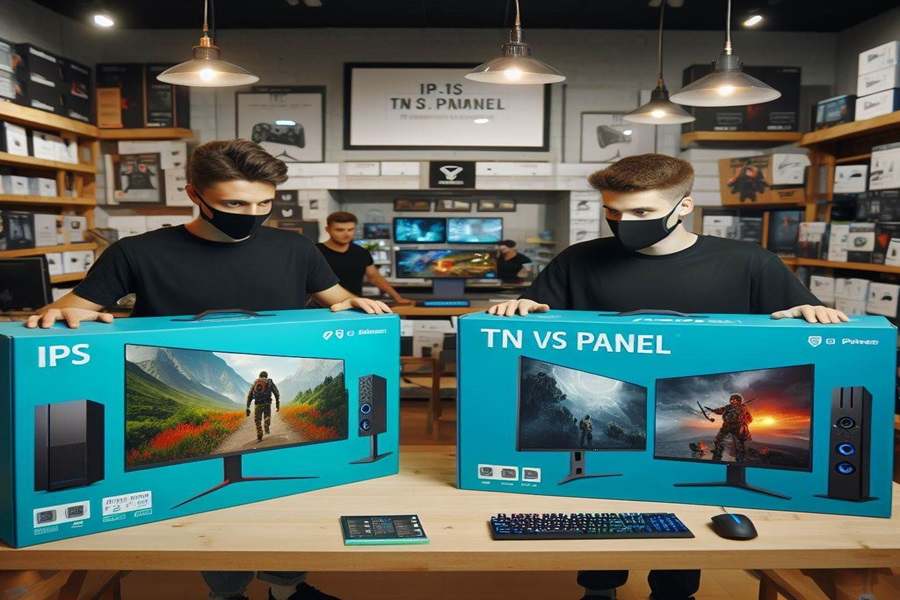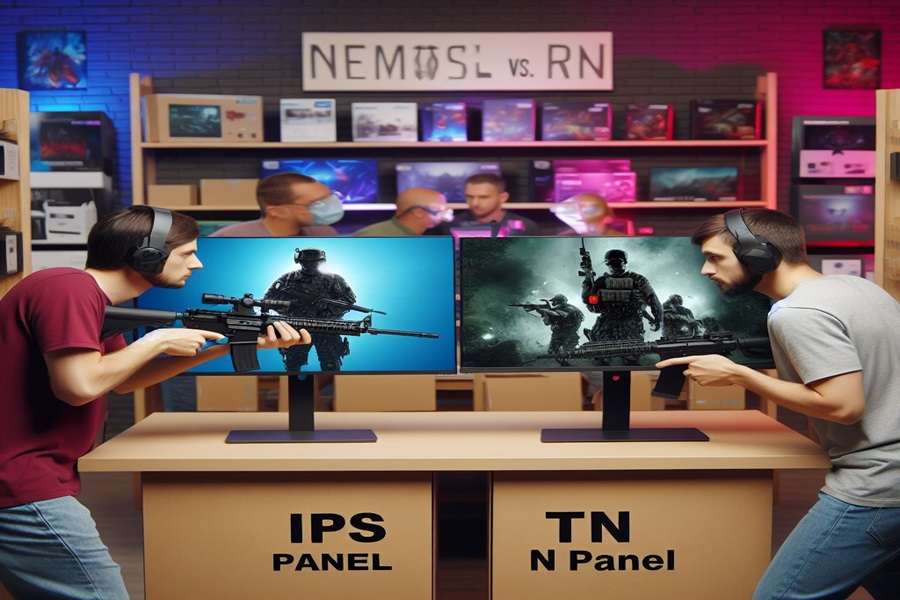
IPS panels offer superior color accuracy and viewing angles. TN panels provide faster response times and are more affordable.
Choosing the right monitor depends on your needs. IPS (In-Plane Switching) panels deliver vibrant colors and wide viewing angles, making them ideal for graphic design, photo editing, and general use. They offer better color consistency and image quality from different angles.
TN (Twisted Nematic) panels excel in response times and are often favored by gamers for their lower input lag and higher refresh rates. They are usually more budget-friendly but suffer from poorer color reproduction and narrower viewing angles.
Understanding the strengths and weaknesses of each type will help you make an informed decision based on your specific requirements.
- Ips Vs Tn Panels: The Basics
- Defining Ips Technology
- Understanding Tn Panels
- Visual Quality Face-off
- Color Accuracy And Consistency
- Viewing Angles Comparison
- Performance Factors
- Response Time Showdown
- Refresh Rates: Gaming And Beyond
- Durability And Lifespan
- Longevity Of Ips Panels
- Tn Panel Durability Challenges
- Price Considerations
- Cost Analysis: Ips Vs Tn
- Investing Wisely: Which Panel Suits Your Budget
- Frequently Asked Questions
- Should I Get Ips Or Tn?
- Which Panel Type Is Best For Monitors?
- What Are The Downsides Of Tn Panels?
- Is Ips Still The Best Monitor?
- What Is The Difference Between Ips And Tn Panels?
- Conclusion
Ips Vs Tn Panels: The Basics
Choosing the right monitor can be challenging. Two popular types of panels are IPS and TN. Each has its pros and cons. This section will help you understand the basics of these technologies. We will explain their features and differences.
Defining Ips Technology
IPS stands for In-Plane Switching. This technology was developed to improve on older TN panels. IPS panel monitors offer better color accuracy and viewing angles. They are great for tasks like photo editing and graphic design.
Advantages of IPS panels include:
- Superior color reproduction
- Wide viewing angles
- Better contrast ratios
However, IPS panels do have some drawbacks:
- Higher cost
- Slower response times
- Potential for backlight bleeding
Understanding Tn Panels
TN stands for Twisted Nematic. These panels are some of the oldest and most common types. TN panel monitors are known for their fast response times and low cost. They are popular in gaming monitors.
Advantages of TN panels include:
- Lower cost
- Faster response times
- Higher refresh rates
However, TN panels have some limitations:
- Poor color accuracy
- Narrow viewing angles
- Lower contrast ratios
| Feature | IPS Panel | TN Panel |
|---|---|---|
| Color Accuracy | High | Low |
| Viewing Angles | Wide | Narrow |
| Response Time | Slower | Faster |
| Cost | Higher | Lower |

Visual Quality Face-off
Choosing the right monitor involves understanding the differences in panel types. Two popular choices are IPS and TN panels.
Color Accuracy And Consistency
Color accuracy is crucial for tasks like photo editing and video production. IPS panels excel in this area. They offer more accurate and consistent colors. This is because they have better color reproduction capabilities.
On the other hand, TN panels are not as strong in color accuracy. They can display colors, but the quality is lower. This makes them less ideal for color-sensitive tasks.
Below is a table comparing color accuracy:
| Panel Type | Color Accuracy | Consistency |
|---|---|---|
| IPS | High | Excellent |
| TN | Moderate | Good |
Viewing Angles Comparison
Viewing angles refer to how well you can see the screen from different sides. IPS panels shine here. They offer wide viewing angles, up to 178 degrees. This means you can see the screen clearly from almost any angle.
TN panels fall short in this area. Their viewing angles are limited. If you look from the side, the colors may look washed out. This can be a drawback for group viewing or multi-monitor setups.
Here’s a quick comparison:
- IPS Panels: Wide viewing angles (up to 178 degrees)
- TN Panels: Limited viewing angles (around 160 degrees)
Understanding these differences can help you decide which panel type suits your needs best. Choose wisely to enhance your visual experience.
Performance Factors
Choosing the right monitor can be challenging. Understanding the performance factors of IPS and TN panels is crucial. These factors determine how well your monitor will perform in various scenarios.
Response Time Showdown
Response time measures how quickly a pixel can change from one color to another. This affects the clarity of fast-moving images.
- TN panels generally have a faster response time, often as low as 1ms.
- IPS panels typically have a slower response time, around 4ms or higher.
This makes TN panels a better choice for fast-paced gaming. IPS panels might show motion blur in such scenarios.
Refresh Rates: Gaming And Beyond
Refresh rate indicates how often the monitor updates with new information per second. It is measured in Hertz (Hz).
| Panel Type | Common Refresh Rates |
|---|---|
| TN Panel | 60Hz, 120Hz, 144Hz, 240Hz |
| IPS Panel | 60Hz, 75Hz, 144Hz |
High refresh rates are beneficial for gaming. TN panels can reach higher refresh rates than IPS panels. Yet, recent IPS panels have made progress in this area.
For tasks beyond gaming, such as graphic design, the refresh rate is less critical. Here, the superior color accuracy of IPS panels becomes important.
Durability And Lifespan
Choosing the right monitor for your needs requires considering its durability and lifespan. Understanding how long a panel lasts and how well it endures wear is crucial. Let’s dive into the durability and lifespan of IPS and TN panels.
Longevity Of Ips Panels
IPS panels are known for their excellent color accuracy and wide viewing angles. They also boast impressive longevity. IPS panels typically offer a lifespan of 50,000 hours. This means they can last over 5 years if used for 8 hours a day.
IPS panels use liquid crystals aligned in a parallel fashion. This design ensures minimal stress on the crystals, leading to a longer lifespan. The backlight technology in IPS panels is also robust, contributing to their durability.
In addition to their longevity, IPS panels maintain their color accuracy and brightness levels over time. This makes them a reliable choice for users who value consistent performance.
Tn Panel Durability Challenges
TN panels are favored for their fast response times and affordability. However, they face some durability challenges. TN panels generally have a shorter lifespan compared to IPS panels. They typically last around 30,000 hours. This translates to about 3 years of daily use for 8 hours a day.
TN panels utilize a twisted nematic design. This design can cause wear and tear on the liquid crystals. Over time, this can lead to degradation in performance and color accuracy. The backlight in TN panels may also deteriorate faster, affecting the overall lifespan of the monitor.
Another challenge for TN panels is their sensitivity to pressure. Applying too much pressure on the screen can cause permanent damage. This makes them less durable in environments where monitors are frequently adjusted or moved.
| Panel Type | Typical Lifespan (Hours) | Key Durability Factors |
|---|---|---|
| IPS | 50,000 | Robust backlight, minimal stress on crystals |
| TN | 30,000 | Fast response, sensitive to pressure |
In summary, IPS panels offer greater longevity and consistent performance. TN panels may have a shorter lifespan and face durability challenges. Choose wisely based on your needs and usage patterns.
Price Considerations
Choosing between an IPS and TN panel for your monitor involves various factors. One key factor is the price. Understanding the cost differences can help you make a smart decision.

Cost Analysis: Ips Vs Tn
The cost of a monitor depends on the panel type. IPS panels are usually more expensive than TN panels. This is due to the technology and benefits they offer. IPS panels provide better color accuracy and wider viewing angles. These features are ideal for graphic designers and video editors.
On the other hand, TN panels are more affordable. They are often chosen for budget-friendly setups. TN panels have faster response times, making them popular for gaming. If you are on a tight budget, a TN panel might be the best option.
| Panel Type | Average Price Range | Key Features |
|---|---|---|
| IPS | $200 – $600 | Better color accuracy, wider viewing angles |
| TN | $100 – $300 | Faster response times, lower cost |
Investing Wisely: Which Panel Suits Your Budget
Budget is crucial when choosing a monitor. If you need a monitor for professional tasks, investing in an IPS panel is wise. The higher cost is justified by the superior display quality. IPS panels are great for photo editing, video production, and graphic design.
For gamers on a budget, a TN panel is a better choice. TN panels offer fast response times and are generally cheaper. This makes them suitable for high-speed gaming. You can enjoy a smooth gaming experience without breaking the bank.
To make an informed choice, consider these factors:
- Usage: Professional work vs. gaming
- Budget: Available funds for the monitor
- Required Features: Color accuracy vs. response time
By considering these points, you can choose the right panel type that fits your needs and budget.
Frequently Asked Questions
Should I Get Ips Or Tn?
Choose IPS for better color accuracy and wider viewing angles. Opt for TN if you need faster response times for gaming.
Which Panel Type Is Best For Monitors?
IPS panels are best for monitors. They offer superior color accuracy, wide viewing angles, and excellent overall performance.
What Are The Downsides Of Tn Panels?
TN panels have limited viewing angles. They often exhibit color shifting. Poor color accuracy compared to IPS and VA panels. Lower contrast ratios.
Is Ips Still The Best Monitor?
IPS monitors are still a top choice for many users. They offer excellent color accuracy and wide viewing angles. Gaming enthusiasts and professionals often prefer them. Other technologies like OLED and VA also have their advantages. The best monitor depends on your specific needs and budget.
What Is The Difference Between Ips And Tn Panels?
IPS panels offer better color accuracy and viewing angles. TN panels provide faster response times and are more affordable.
Conclusion
Choosing between IPS and TN panels depends on your needs. IPS offers better color accuracy and viewing angles. TN panels excel in response times and are budget-friendly.
Evaluate your priorities to decide the best monitor for you. Both options have their unique advantages, ensuring you find the perfect fit for your usage.

Logan Anderson is a forward-thinking writer who explores the cutting edge of gaming and monitor technology. With a knack for uncovering upcoming trends, he keeps his readers ahead of the curve. Logan’s background in software development allows him to offer a unique perspective on the intersection of hardware and software, making his reviews not just informative but forward-looking.